The election in Boston of Mayor Michelle Wu this November showed what is possible for Asian Americans as they become a more active and influential bloc in Massachusetts, but elected officials and advocates for the community said Wednesday more must be done to improve representation at all levels of government and fight racism and attitudes of “perpetual foreignness.”
Wu, the daughter of Taiwanese immigrants, became the first woman and person of color elected to lead the city of Boston this fall. Her position at the top of city government, however, is a rarity across Massachusetts where despite representing the fastest growing racial group in the state Asian Americans are underrepresented on Beacon Hill, in municipal government, and in schools.
The Boston Foundation hosted an online discussion Wednesday about how to build the civic power of Asian Americans and Pacific Islanders, turning to elected officials, community organizers and leaders of the foundation’s Asian Community Fund for advice and insight.
Wu, in a message taped for attendees, said gentrification threatens to displace many in the Asian community in Boston, and the ongoing pandemic that has been “politicized” against Asian Americans has led to “targeted, hateful, senseless violence.”
“We must come together to address these and many other issues that are impacting our communities,” Wu said.
Anne Calef, of Boston Indicators, said that the Asian American population in Greater Boston over the last 30 years has grown by 277,409, making it the fastest growing single racial group in the city of Boston and the region and trailing only Latinos in terms of total new residents.
Growth has been particularly strong in the suburbs of Boston, Calef said, where Asian Americans now account for more than 30 percent of the population in places like Lexington and Quincy, and in Braintree the town has seen a 151 percent increase in AAPI population over the last decade.
Calef, however, said Asian Americans continue to be underrepresented in municipal government, particularly in schools. In Quincy for instance, 41 percent of students but only 5 percent of teachers are Asian American.
The AAPI community also now accounts for about 7.2 percent of the state population, but only 4.5 percent of the state Legislature, where there are eight House members and one senator who identify as Asian American.
Paul Watanabe, a UMass Boston political science professor and director of the Institute for Asian American Studies, said a national poll conducted last spring found that 42 percent of Americans cannot name a single prominent Asian American.
“In Boston, I would suggest that now with the election of Michelle Wu, unless you’re under a rock or something, you can probably name a prominent Asian American and that’s the mayor of the city of Boston,” Watanabe said.
Watanabe said a “singular” way to empower the Asian American community would be to allow non-citizen residents to vote in local elections, a step the New York City Council took this month. Voter registration requirements and the lack of availability of bilingual ballots are also barriers to political participation, he said.
“In order to overcome the historic invisibility of AAPI communities, we need to build power and this means not only expanding our representation in state and municipal leadership, but also sharing power, specifically broadening the base of residents who are involved in grassroots organizing and political engagement,” said Danielle Kim, director of The Boston Foundation’s Asian Community Fund.
Rep. Vanna Howard, a first-term Cambodian representative from Lowell, credited her success to her willingness to be in the community and to listen.
“I devoted basically, simply my shoe leather to the community,” Howard said. “I’m here. I’m accessible. I always listen.”
Howard said that approach extends to her colleagues in the House, stressing the importance of building relationships and learning how her priorities might overlap with those of other lawmakers. She specifically noted the inclusion of $20 million in the recently signed American Rescue Plan Act spending bill to support the resettlement of Afghan refugees.
“I didn’t do that alone. It was with the leadership of Reps. [Ruth] Balser and [James] O’Day,” she said, also thanking Sen. Jamie Eldridge for his partnership in that branch.
Raj Melville, executive director of the Deshpande Foundation, said it’s important to help build talent pipelines for Asian Americans, whether its to help them get certified to teach in schools or to get elected to Town Meeting or the local school committee.
And Nina Liang, the first minority president of the Quincy City Council, said future leaders of the community must put in the time to hear from those they wish to represent.
“We do have imposter syndrome,” Liang said. “I certainly do.”
On Friday, the Asian Community Fund announced that Danielle Kim, director of public policy at the United Way of Massachusetts Bay and Merrimack Valley, has been named the fund’s first-ever director.
Kim will join the Boston Foundation staff on Dec. 20. A graduate of Smith College, Kim earned a Fulbright Fellowship in South Korea and worked in the New Jersey Legislature before coming to the Boston area to earn a master’s degree from Harvard Graduate School of Education. She then spent four years at Boston After School & Beyond, overseeing policy and communications for the organization.
(Copyright (c) 2024 State House News Service.

